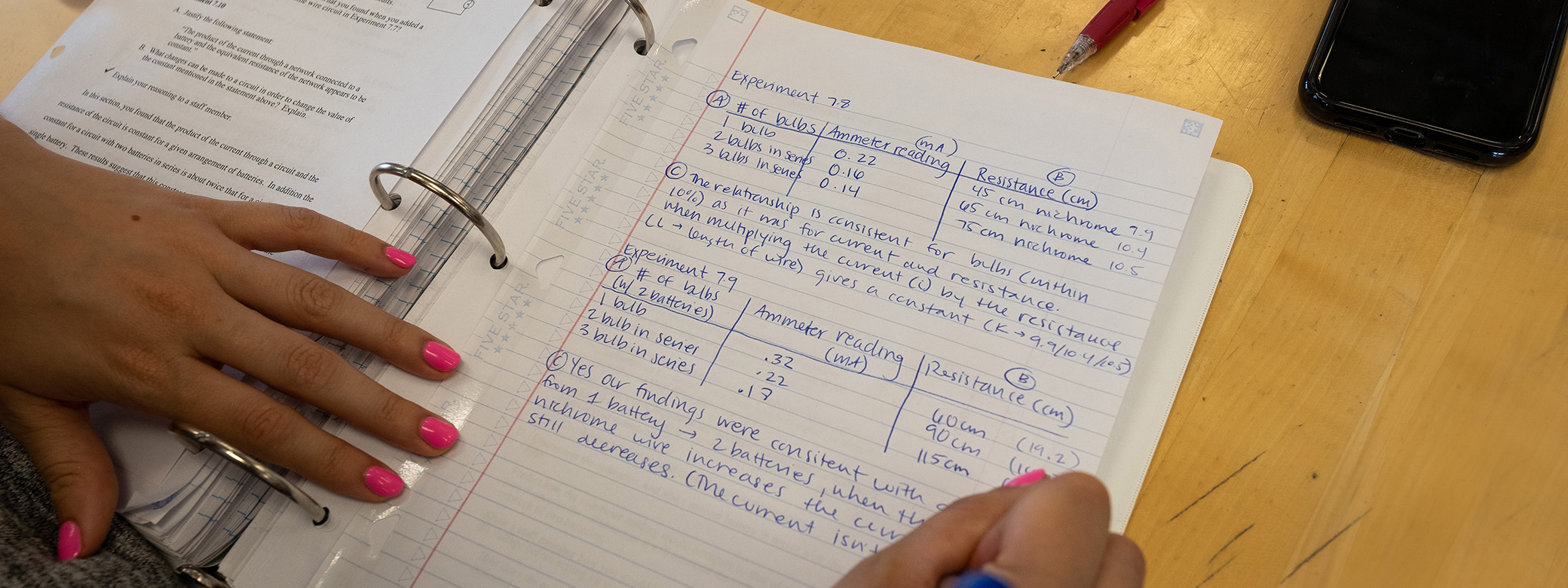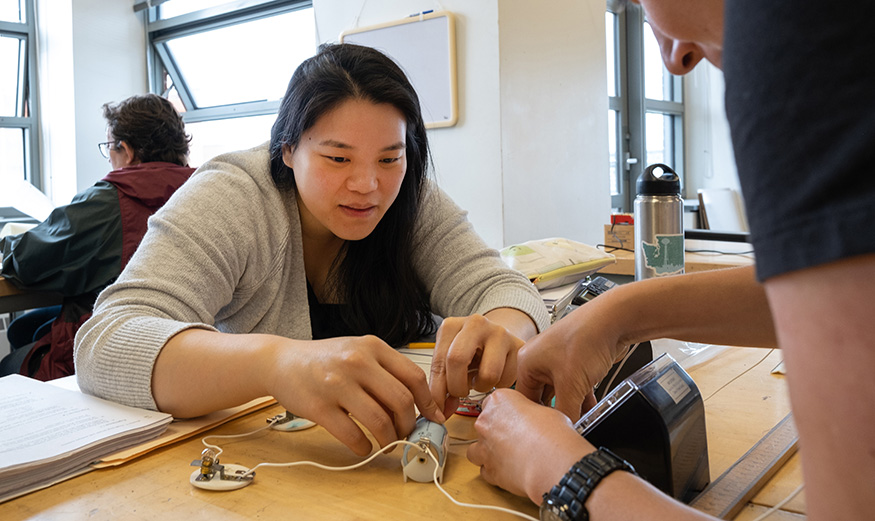
As a science teacher at Cleveland High School in Seattle, Christal Lee is accustomed to teaching multiple subjects. Though her background is in chemistry, she teaches courses in biology and physics as well. Seattle Preparatory Academy teachers Hannah O’Brien and Alex Behrman also teach physics in addition to their own scientific specialty.
All three wanted a more thorough understanding of physics to better serve their students. That led them to spend four weeks this summer at the University of Washington through the Summer Institute in Physics and Physical Science, a program for in-service teachers. Based in the UW Department of Physics in the College of Arts and Sciences, the Summer Institute was reintroduced after a six-year hiatus.
“Physics is really hard, especially AP [advanced placement] physics, so conveying difficult concepts was something I wanted to get better at,” says Behrman, who first taught AP physics this past year. “I signed up because several teachers from our school had been in this program before and spoke very highly of it, saying it was unlike any other professional development. Now I know why.”
An Inquiry-Based Approach
The director of the Summer Institute, Donna Messina, has firsthand experience with the challenges high school science teachers face. Now an associate teaching professor of physics, Messina previously taught high school science for years. When physics was added to her high school teaching responsibilities, she didn’t feel prepared. She signed up for the Summer Institute and found it so helpful she participated for three summers.
That was Messina’s first introduction to an approach known as Physics by Inquiry. It had a huge impact on her teaching. She hopes the same will be true for this summer’s participants.
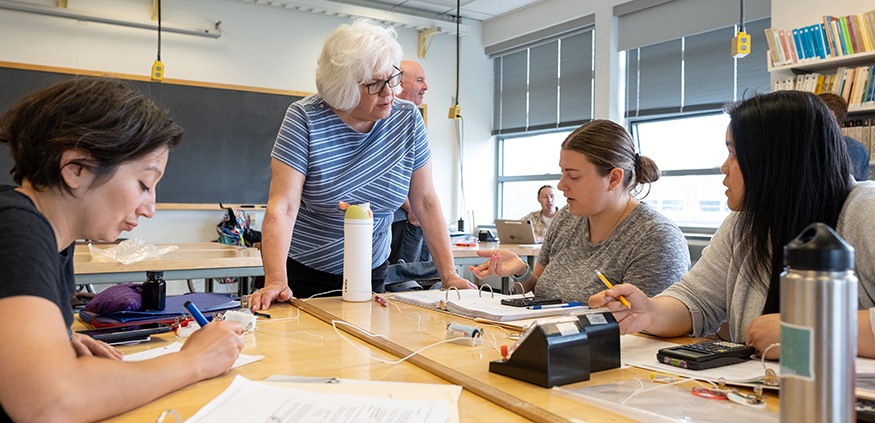
“I gave the best lectures when I taught high school,” Messina says. “They were so good. But what I came to realize through Physics by Inquiry is that the students did not understand. They were just very good at parroting back what I had said. They were not owning their learning. They were just borrowing mine.”
Physics by Inquiry involves asking pointed questions that require students to explain the reasoning behind what they’re learning, based on observation. Responding with memorized words or equations won’t cut it. The idea may sound simple, but the process can be challenging for both teacher and student, as this year’s institute participants learned. At pivotal points in the curriculum — kinematics (motion) in the morning, electric circuits in the afternoon — they were asked to respond to probing questions posed by Messina and peer instructors Chuck Kralovich and Michael O’Byrne.
“For teachers who aren’t using inquiry instructional strategies in their own classrooms, the program modeled that very effectively,” says Lee. “Of course, having 32 kids in our own classrooms will make it harder to do, but it’s helpful to see what’s involved.” (Nine teachers attended the Summer Institute.) Adds O’Brien, “We can’t do the same level of one-on-one time we get here, but we can take practices from this and modify them for our classroom.”
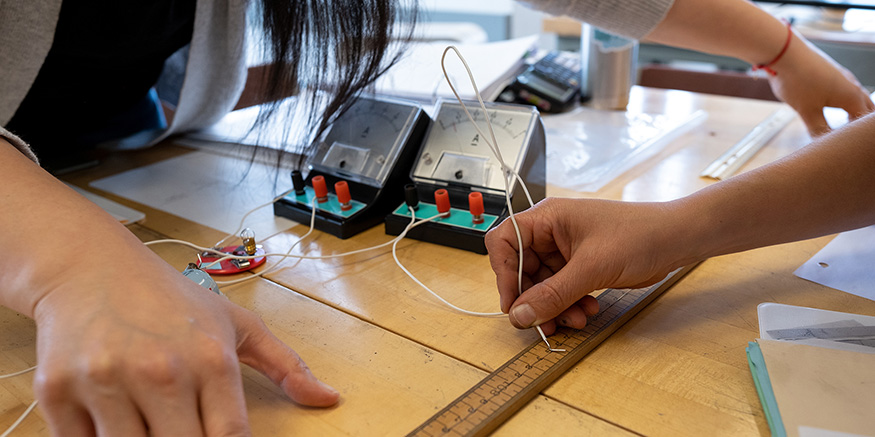
Another important takeaway from the institute: It’s hard being a student. Spending a month in that role reminded the teachers how exhausting a school day can be.
“It’s not something I anticipated, but one of the biggest benefits was experiencing how tiring it is to go through curriculum,” says O’Brien. “And what it really feels like to do group work again, with partners you maybe don’t know that well, or genuinely sit for a test again." (The teachers had a midterm, a final, homework assignments, and a term paper.)
Behrman also felt sympathy for his high school students when he answered things wrong during the Summer Institute. “It’s a feeling I hadn’t had in so long,” he says. “It’s a little hit to the ego, but that’s okay. I can take it. And then there’s that eureka moment from learning something new, which is really fun.”
Messina adapted the Physics by Inquiry curriculum — created by Lillian McDermott and the UW Physics Education Group — to maximize those eureka moments. Working with a graduate student, she introduced teachers to the virtual reality (VR) technology being used in introductory-level tutorial sessions at the University. Additionally, Messina engaged the teachers in the use of technology already available in their classrooms to update traditional physics experiments. The group also visited a UW introductory physics course, which provided insights into possible next steps for their students. At weekly lunches, teachers and Institute staff discussed topics such as inclusivity in physics education, career paths in the discipline, and — with input from a current UW student — challenges students should expect when majoring in physics.
Honoring a Leader in Physics Education
Given the robust Summer Institute curriculum this year, the biggest surprise is that it almost didn’t happen. The Summer Institute had been funded by the National Science Foundation for more than four decades, with up to 35 teachers participating at the UW each summer. But that funding ended in 2017, leaving the future of the program in question.
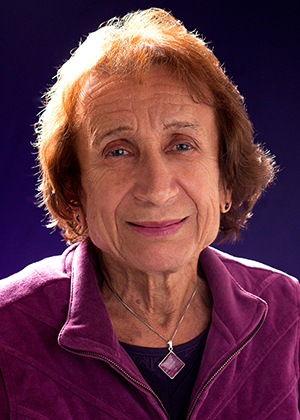
That might have been the end of the Summer Institute if not for the generosity of Melanie, Connie, and Bruce McDermott, who created the Lillian Christie McDermott Term Memorial Fund in memory of their mother, a UW professor of physics and pioneer in physics education research. Lillian McDermott was a founder of the UW Physics Education Group (PEG), a scientific research group in the field of physics education. Through PEG, she created the Summer Institute.
“My mother’s entire career was dedicated to physics education — both as an endeavor and, inextricably, as a scientific discipline,” says Melanie McDermott.
Melanie and Connie still remember visiting the Summer Institute as “young student guinea pigs” when they were in grade school. (In the past, the institute included teachers from lower grades.) Even at that tender age, their mother used inquiry-based methods to confirm their understanding of what they’d just learned. “I remember my triumph one day as my mother drove me home after ‘class,’ when I landed on my own definition of density as a result of her questioning me about what I’d observed earlier that day,” says Melanie.
The McDermotts’ gift supports PEG, and through PEG the Summer Institute. Their hope is that other funding sources will sustain the program in the future. “The amount that the McDermott Fund can currently provide is tiny compared to the funding that NSF provided for decades,” Melanie says. “We know that we need to attract more funding to sustain this wonderful program.”
[Lillian McDermott's children] are supporting her even after she is no longer able to be part of the Summer Institute. Lillian’s legacy is and always will be at the heart of it.
That said, the family’s generosity has meant a great deal to those involved with PEG and the Summer Institute.
“It brings tears to my eyes that Lillian’s children are honoring her by doing what they can until more resources are found,” Messina says. “They are supporting her even after she is no longer able to be part of the Summer Institute. Lillian’s legacy is and always will be at the heart of it.”
More Stories
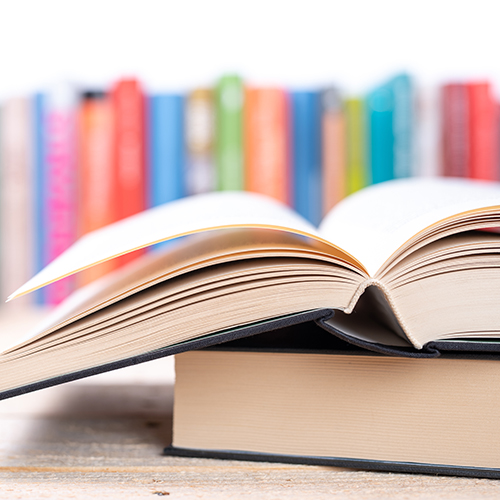
Exploring Connections Through Global Literary Studies
The UW's new Global Literary Studies major encourages students to explore literary traditions from around the globe and all eras of human history.

What the Sky Teaches Us
Brittany Kamai, an astrophysicist with knowledge of Pacific Islanders' Indigenous navigation using the sky, is teaching a new UW course, Pacific Indigenous Astrophysics.
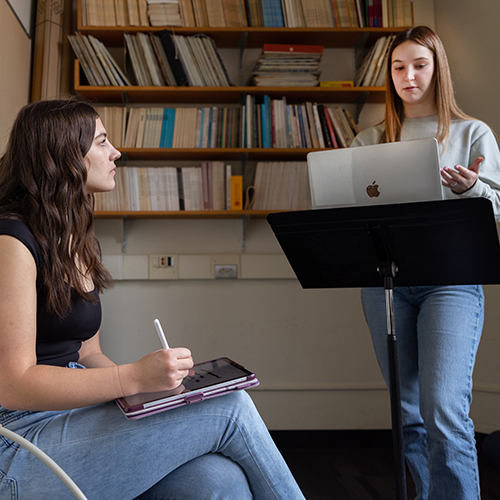
The Truth About Public Speaking
Becoming an effective public speaker requires planning and practice. Professor Matt McGarrity and consultants at the UW Center for Speech & Debate are available to help.
